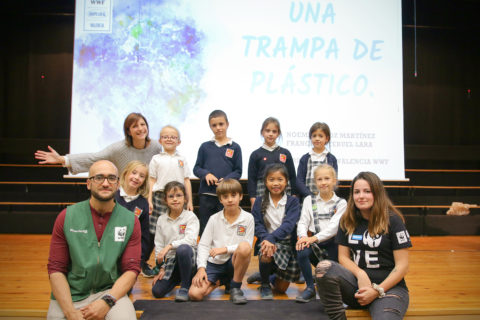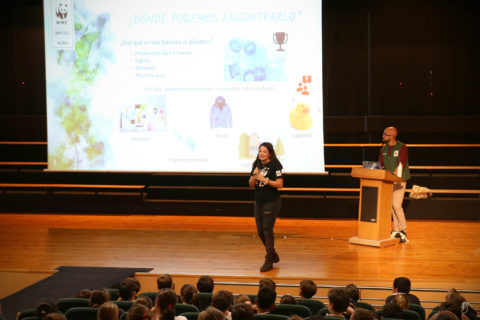WWF at Caxton College: ‘Every week we ingest the amount of plastic in a credit card’
In the European Week for Waste Reduction, this international NGO asks for the collaboration of Primary pupils at Caxton College
The impact of microplastics on the ocean is incessant. It is a real threat and is causing tremendously adverse effects on the ocean fauna, and as a result, on human beings. The biologist Noemí Muñoz, a member of the World Wildlife Fund (WWF) team in Valencia, had this to say on the topic: ‘Microplastics are fragments smaller than 5 millimetres that end up being inadvertently incorporated into the food chain. Plankton looks very similar to these plastic particles, so many fish eat them by mistake. This is how, when we eat fish, we are putting harmful plastics into our bodies’.
This was a clear example of the serious consequences that the abusive use of plastics is having on the planet, but there were more. Francisco Teruel, co-ordinator in Valencia of the WWF team, declared that ‘every year in Europe, we produce five hundred million tonnes of plastic waste, or the equivalent of sixty-six thousand refuse trucks’. If we do not take measures to change this, ‘in the year 2050, there will be more plastic than fish in the oceans’, Teruel affirmed.
‘It is very important for you to be aware of the importance of this, and that you tell your friends and family about it, so that all of us can work together to clean up the planet and make it a healthier place to live’. With this visit, the WWF representatives informed a young audience that is already very aware of the importance of sustainability due to the environmental campaigns that the school has been organising for many years. A group of students called ‘Eco Warriors’, who promote ecological initiatives, went onstage to help the WWF representatives explain how to properly recycle waste.
How can we take on this challenge? WWF recommends that everyone implement the three Rs: reuse, recycle and most importantly, reduce. ‘We all have to work together to find alternatives to plastic and share these discoveries so the world can see that there are many ways to save the planet from the threat of plastic’, concluded Muñoz, who together with Teruel, made it clear that stopping the deterioration of the planet is simple if we just act responsibly.


